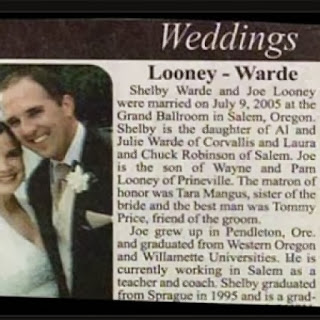I’ve noticed a lot more hyphenated last names recently,
especially on children. As I understand it, in general the hyphenated last name
is a combination of the husband’s last name along with the wife’s maiden name.
(Although I’m sure there are exceptions to this rule.)
However, as I think about it, I see this possibly leading to
all sorts of confusion, issues and even possible arguments and tensions down
the road.
Before I get to that, let me set one thing clear: I believe
in equal rights for women and men. I don’t see men as superior over women or
vice-versa.
Traditionally, when a woman marries a man she takes on his
last name. However, as I’ve been told, some women see that as unfair—it’s a
tradition from a less enlightened time. Some women elect to keep their maiden
name. That’s their choice, and I respect that.
Then there are those couples who elect to hyphenate their
last name. One of the reasons why, as I understand it, is so their children
will have their same last name. It can also be seen as a “true merger” between
the couple.
And thus we arrive at the questions and concerns I have.
(This is where you put on your “satire” glasses.)
What determines which name goes first? If it is the man’s
name, isn’t that still sexist—meaning it is still leaning on the tradition of
the man being dominant?
Or is it done alphabetically? And then what about those
people who happen to have the same last name before the get married? Would
their last name be Smith-Smith?
And then, there is the issue of the children of future generations.
Imagine the following situation:
John Jones and Mary Brown get married. They decide to
hyphenate their last name. They are now Mrs. and Mr. Brown-Jones. (They chose
the alphabetical method.) They have a son, Bobby. Bobby’s official last name is
Brown-Jones.
Across town, Henry Smith and Jane Taylor get married. They
decide to hyphenate their last name. They are now Mr. and Mrs. Smith-Taylor.
(They flipped a coin on which name came first.) They have a daughter, Peggy. Peggy’s
official last name is Smith-Taylor.
Bobby Brown-Jones grows up, meets and falls in love with
Peggy Smith-Taylor. They are both enlightened people, as is proven by their last
names. When they get married, what will their new last name be? Wouldn’t it
have to be Brown-Jones-Smith-Taylor? Or maybe Smith-Taylor-Brown-Jones?
Let’s say it is the first one: Brown-Jones-Smith-Taylor.
They have a son, Jimmy. His name is Jimmy Brown-Jones-Smith-Taylor.
He grows up, meets and falls in love with Betty Johnson-Anderson-Davis-Miller.
They get married, and after playing rock, paper, scissors, elect to go with the
last name of Johnson-Anderson-Davis-Miller-Brown-Jones-Smith-Taylor.
Yikes! That name won’t fit on a driver’s license or a school
roll, or even the IRS tax forms (though the government has been very supportive
of people’s rights to choose their own names.)
How could we solve such an issue? Well, for starters, if any
of the last names are the same, we could use a math trick. For example,
Brown-Smith-Brown-Anderson-Smith-Davis-Smith could become Brown^2-Smith^3-Anderson-Davis.
A bonus from doing this is that the character above the number “6” on the
keyboard would be used more.
Or, we could just take the first letters of all the last
names and make a new name out of that. So, in that case, Upton-Richards-Anderson-Davis-Ingersoll-Moore-Williams-Ingle-Thompson
could be Uradimwit.
Or perhaps, just perhaps, there is a reason for people using
only one last name for centuries.
Nah, that couldn’t be it.



























